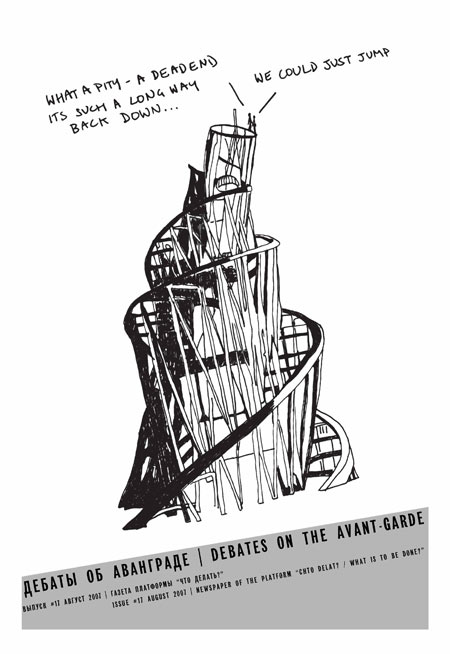Magun: The question we would like to discuss with you today is the connection between aesthetics and politics. Is there a specific type of art that would be both productive and relevant to the contemporary political and cultural situation? Our hypothesis is that the avant-garde – both as a phenomenon and a notion – could be important for us today. This view comes out of our historical situation, which was shaped by the constitutive moment of perestroika. As democratic mobilization challenged the authoritarian and corrupt power of the Soviet state, there was a major revival of interest in both Western modernism (not just Kafka and Joyce, but also Pollock, etc.) and the Soviet avant-garde art of the 1920-30s; what seemed important was the conjunction of this type of art with political emancipation. What do you think? Is the avant-garde is still usable as a notion?
Ranciére: What strikes me is precisely that your relation to avant-gardist art was mediated through the democratic aspirations of the time of the perestroika. This means that it took its relevance in a certain present as a thing of the past. The question is: what thing and what past exactly? It seems to me that there are two concepts of avant-garde art and of its political effect. There is the idea of avant-garde art as an art intentionally designed to create new forms of life. Such was the art of the Russian futurists and constructivists, the art of El Lissitsky , Rodtchenko and their likes. They were people who really had a project to change the world, using certain materials and certain forms. Avant-garde art, in that way, was destined to create a new fabric of common sensible life, erasing the very difference between the artistic sphere and the political sphere. When you mention Kafka, Joyce or Pollock, it is not the same at all. What they have in common with the former is the rejection of standard representational art. But they did not want to create new forms of life, they did not want to merge art and politics. In this case, the political effect of art is something like what you mentioned: a transformation of our ways of feeling and thinking, the construction of a new sensorium. But this new sensorium is not the consequence of a desire to create new forms of collective experience. Instead it is the very break between the contexts in which Joyce or Kafka created and the context in which you read them that gave them their ‘political’ relevance. So, I would say, first, that the idea of the avant-garde entails two different things, two different ideas of the connection between the artistic and the political, second, that the concept of the avant-garde that you had in mind at that time was a retrospective construction. As a matter of fact, avant-gardism and modernism as they are used in contemporary debates are retrospective constructions that are supposed to allow us to have it both ways: to have both the collective impulse and aspiration to a new life and the separating effect of the aesthetic break.















